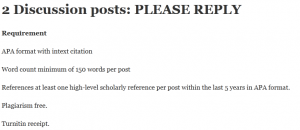2 Discussion posts: PLEASE REPLY

Requirement
APA format with intext citation
Word count minimum of 150 words per post
References at least one high-level scholarly reference per post within the last 5 years in APA format.
Plagiarism free.
Turnitin receipt.
DISCUSSION POST # 1 Betsy
A 78 year old male presents with diagnosis of heart failure
Heart failure arises because of myriad issues, and it is characterized by the heart’s inability to pump blood effectively, making it unable to meet the body’s requirements. According to Malik et al. (2022), the condition can arise from any disorder that impairs ventricular filling or the ejection of blood to systemic circulation. There are also other triggering factors of heart failure, such as diabetes and other congenital heart diseases.
Symptoms of Patients and the Patho Principles
Heart failure as a disease can present acutely as a consequence of acute myocardial infarction or hypertensive emergency or, in other cases, in patients with stable heart failure symptoms for months which can also decompensate acutely (Schwinger, 2021). The acute decompensation of chronic heart failure is one of the most common forms of clinical presentation of acute heart failure.
Hypertrophy and Heart Failure
After the onset of heart failure it is preceded by cardiac hypertrophy which is a response to the hearts increased workload (Schwinger, 2021). Hypertrophy is characterized by an increase in cardiomyocte size and the thickening of the ventricular walls.
Ischemic Disease
One of the most causes of heart failure is an ischemic disease, and in most cases, it is attributed to coronary artery disease. According to Severino et al. (2020), ischemia can lead to heart failure as such, I believe the patient requires to undergo further testing to determine if the patient has the ischemic disease, thereby ruling out the possibility of having other conditions that might lead to heart failure.
Virchow’s Triad
According to Kushner et al. (2021), Virchow’s triad comprises three factors that can predispose an individual to the development of venous thrombosis with the factors including stasis, endothelial injury, and hypercoagulability. Rudolf Virchow is accredited in examining venous thrombosis to a cellular level since the physician believed that most diseases are caused by cellular pathology.
The Mayo Clinic defines heart failure as— sometimes known as congestive heart failure occurs when the heart muscle doesn’t pump blood as well as it should. When this happens, blood often backs up and fluid can build up in the lungs, causing shortness of breath (Mayo Clinic, 2021). Heart failure manifestation and symptoms are classified according to its form, like acute heart failure or chronic heart failure. Heavy breathing, chest pain, heart palpitations, and edema are some symptoms manifested in acute heart failure, all are suddenly and are severe from the beginning. With the right treatment patient with acute heart failure have a better prognosis and symptoms are manageable. With chronic heart failure the manifestation is gradually and symptoms tents to get more intense as it progresses.
The heart adapts to a sustained increase in blood pressure, or a sustained increase in blood volume, by increasing cardiac muscle mass and this growth in myocardium is broadly defined as cardiac hypertrophy (Oldfield et al., 2020). There are two types of cardiac hypertrophy, there is the pathological and the physiological. In physiological hypertrophy, we see an increase in cardiac mass, which we can observe more in athletes because of their high level of intensity during their exercise routine, but it does not cause them any heart problems, for example. Then there is the pathological one, which is when the heart shows a deterioration in contractility and this functional deterioration of the ventricles are some causes of heart failure.
Yes, I could say that the patient has ischemic heart disease, because it is one cause seen most frequently in patients with heart failure. The patient may have a history of arteriosclerosis, which causes ischemic heart disease.
The pathologist Rudolf Virchow was the one who first described the pathology of venous thrombi over 100 years ago and according to (Kushner et al., 2021),Virchow’s triad consists of three factors that may predispose a person to the development of venous thrombosis. These factors include: Hypercoagulability, Stasis and Endothelial injury. These thrombi are formed, for example, when there is an accumulation of platelets. This problem can be partly hereditary or because of other problems such as hormone therapy, pregnancy, surgery, blood disorders, obesity, and atherosclerosis.